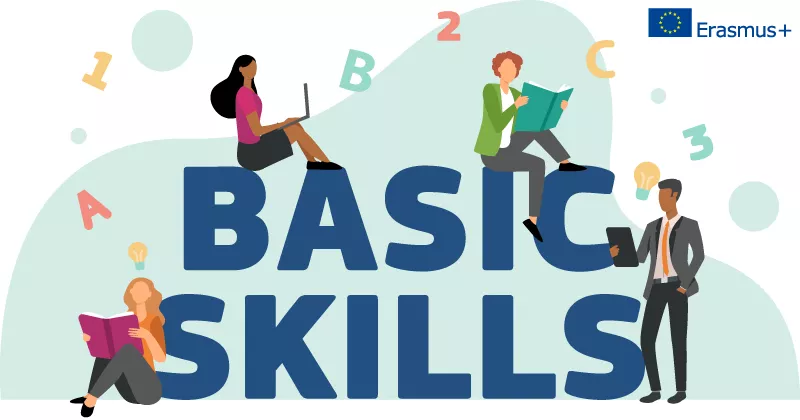EPALE discussion: Basic skills learning provision

Ensuring basic skills for all is a necessary step to enable societies to combat current and future social, health, environmental and economic challenges, and to implement policies effectively in order to support the sustainability of European societies and economies and promote a healthier planet.
Basic skills are transversal. Not only are they relevant to educational policy, but also to employment, health, social and environmental policies. Building cohesive policy measures which support people with basic skills needs is necessary not only to make Upskilling Pathways a success, but also to help build more resilient and inclusive societies.
The online discussion will take place on this page on 16-17 September between 10:00 and 16:00 CET and will be moderated by EPALE Thematic Coordinators of EBSN Graciela Sbertoli (Secretary General of EBSN) and Tamás Harangozó.
The discussion on 16 and 17 September will include the following topics:
- critical literacy
- health literacy
- financial literacy
- numeracy
- basic digital skills for the future.
Please join our online discussion on Basic skills learning provision on 16-17 September 2020!
Comments will be open on 7 September so participants can introduce themselves or post their comments in advance.
Comentariu
Yes, we do have some very
- Loghează-te sau înregistrează-te să postezi comentarii
Could you give us a link, Eva?
- Loghează-te sau înregistrează-te să postezi comentarii
I will probably make a short
- Loghează-te sau înregistrează-te să postezi comentarii
Thank you!
- Loghează-te sau înregistrează-te să postezi comentarii
Greetings from Hungary
- Loghează-te sau înregistrează-te să postezi comentarii
Welcome, Eva!
- Loghează-te sau înregistrează-te să postezi comentarii
basic in Latvia
- Loghează-te sau înregistrează-te să postezi comentarii
Wonderful, Ilze!
- Loghează-te sau înregistrează-te să postezi comentarii
LURKERS, we want to "hear" your voice!
- Loghează-te sau înregistrează-te să postezi comentarii
from Latvia
- Loghează-te sau înregistrează-te să postezi comentarii
That is very understandable...
- Loghează-te sau înregistrează-te să postezi comentarii
New question to all participants:
- Loghează-te sau înregistrează-te să postezi comentarii
Target group?
- Loghează-te sau înregistrează-te să postezi comentarii
In the case of Norway...
- Loghează-te sau înregistrează-te să postezi comentarii
Indeed, wWe are still
- Loghează-te sau înregistrează-te să postezi comentarii
Nice example from German newspaper
- Loghează-te sau înregistrează-te să postezi comentarii
Exactly! And that is actually...
- Loghează-te sau înregistrează-te să postezi comentarii
\Yes, if only 10% of the
- Loghează-te sau înregistrează-te să postezi comentarii
If psychological factors are
- Loghează-te sau înregistrează-te să postezi comentarii
How the learning is presented...
- Loghează-te sau înregistrează-te să postezi comentarii
Edutainment math
- Loghează-te sau înregistrează-te să postezi comentarii
Math edutainment
- Loghează-te sau înregistrează-te să postezi comentarii
Link to Gamification
- Loghează-te sau înregistrează-te să postezi comentarii
courses
I think these courses are crucial to educate adult learners. When applying fun stuff related to their context they will find it extremely useful and might encourage others to join as well.
- Loghează-te sau înregistrează-te să postezi comentarii
I agree
- Loghează-te sau înregistrează-te să postezi comentarii
Learning
I believe that it should be relevant to their context otherwise they might not find it useful.
- Loghează-te sau înregistrează-te să postezi comentarii
Or maybe motivating them: if
- Loghează-te sau înregistrează-te să postezi comentarii
Welcome in the last half an hour of the discussion, Alena!
- Loghează-te sau înregistrează-te să postezi comentarii
Numeracy
- Loghează-te sau înregistrează-te să postezi comentarii
Welcome, Kees!
- Loghează-te sau înregistrează-te să postezi comentarii
I tried to give some input,
- Loghează-te sau înregistrează-te să postezi comentarii
Disable auto-refresh!
- Loghează-te sau înregistrează-te să postezi comentarii
Absolutely true that numeracy
- Loghează-te sau înregistrează-te să postezi comentarii
Gamification in financial literacy
- Loghează-te sau înregistrează-te să postezi comentarii
Financial literacy - a link for good practice
- Loghează-te sau înregistrează-te să postezi comentarii
Goodbye
- Loghează-te sau înregistrează-te să postezi comentarii
ZPM special: Numeracy and vulnerability in adult life
- Loghează-te sau înregistrează-te să postezi comentarii
Thank you!
- Loghează-te sau înregistrează-te să postezi comentarii
Numeracy
- Loghează-te sau înregistrează-te să postezi comentarii
developments
- Loghează-te sau înregistrează-te să postezi comentarii
Frameworks
- Loghează-te sau înregistrează-te să postezi comentarii
Common European Numeracy Framework
- Loghează-te sau înregistrează-te să postezi comentarii
That holistic view...
- Loghează-te sau înregistrează-te să postezi comentarii
At the eond of 2021 we hope
- Loghează-te sau înregistrează-te să postezi comentarii
EBSN OER collection and MOOC
- Loghează-te sau înregistrează-te să postezi comentarii
I think the OER and MOOC on
- Loghează-te sau înregistrează-te să postezi comentarii
Typical challenges
I would be cusrious to read about "typical" challenges participants of this discussion faced when it comes to numeracy or in general basic skills training programmes.
Kees, based on you experience, what would you say the most typical challenges are to participants besides the fear of numbers?
- Loghează-te sau înregistrează-te să postezi comentarii


End of Day 2 - but not necessarily end of the discussion